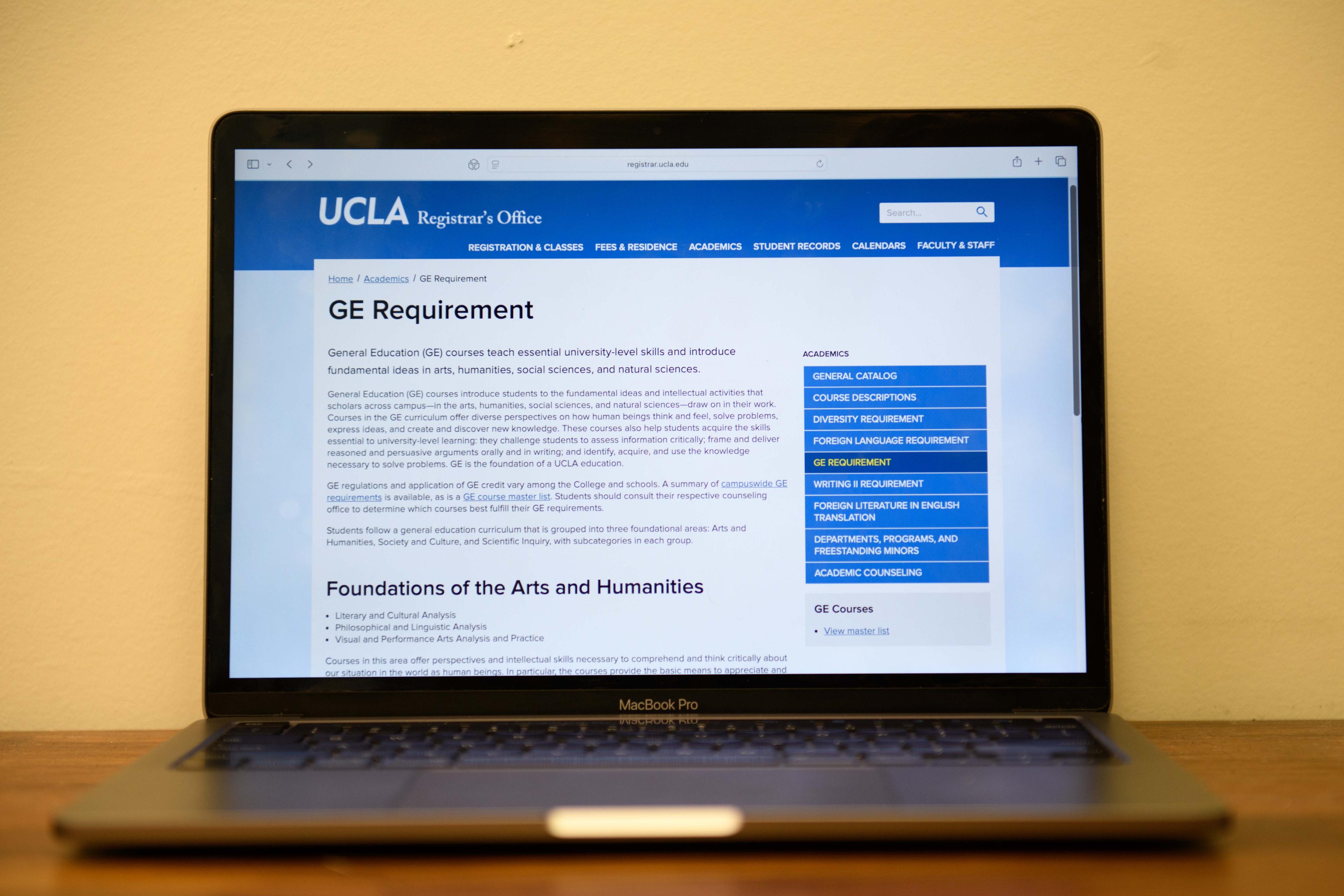General education task force seeks to revise program
A computer showing UCLA’s general education requirements is pictured. A task force made of professors is seeking to redesign current GE requirements. (Catherine Price/Daily Bruin)
By Alexis Muchnik
June 8, 2025 7:25 p.m.
This post was updated July 9 at 12:07 p.m.
A task force is considering new ways to revamp UCLA’s general education program.
The task force, which consists of professors across departments, was created to redesign current GE requirements and create a plan to implement the new changes. The decision to create the task force came following a 2021 self-review, conducted by an ad hoc committee made up of former General Education Governance Committee chairs, GEGC members, Cluster Program Faculty Advisory Committee members and faculty with experience in the GE program.
External reviewers from the University of Virginia and Johns Hopkins University, in conjunction with members of the Undergraduate Council of the Academic Senate, also conducted a review of UCLA GE requirements during the 2022-2023 academic year following the self-report.
The task force held town hall meetings for students and faculty in spring 2025 to share its existing findings and hear input from the larger UCLA community. Muriel McClendon, the chair of the committee, said at a May 21 town hall that the task force has been centering student experiences in its deliberations.
McClendon, an associate professor of history, said the current GE program is almost 20 years old and no longer supports the “needs of our world.” She added that the task force has concerns about the GE program failing to provide a coherent experience for students and lacking a clear mission.
McClendon revealed a tentative update to the guiding principles, curricula and categories of the GE program at the town hall, which included six guiding principles meant to ensure students can navigate the university, introduce students to interdisciplinary learning, expose students to diverse perspectives, establish a scientific foundation and emphasize data literacy skills, prepare students for the professional world and facilitate empathy and curiosity.
The task force also proposed a requiring series of three courses or a cluster for first-year students to acclimate them to college life.
The task force met with faculty and staff as well as deans and UCLA Teaching & Learning Center campus partners to receive community feedback on the current GE program, McClendon said. The task force is currently meeting with students, she added.
“We’re talking to everybody who will talk to us, and we’ll talk to people who don’t want to talk to us,” McClendon said.
Leigh Harris, the assistant vice provost of Undergraduate Education Initiatives in the Division of Undergraduate Education, said the task force has been mostly focused on learning about community needs.
“The GE task force has been very focused on communication and transparency,” Harris added.
Additionally, the task force has looked at GE systems at other institutions, including the University of Virginia, University of North Carolina at Chapel Hill and Boston University, McClendon said. She added that the task force has considered incorporating features of an integrative system, which focuses on big ideas, diversity of subjects and flexibility as opposed to the distributive system which focuses on disciplines.
Based on the 2021 self-review, the ad hoc committee recommended the creation of a centralized organization and a new mission statement for the GE program. The review also advocated for a switch to an integrative course model, which favors interdisciplinary learning instead of the current model where required courses are separated into different categories.
The review also recommended that the cluster program – in which first-year students take three interdisciplinary courses in sequence that fulfill multiple GE requirements, including the Writing II requirement – should be required for all students and integrate major and minor course credits more cohesively into its curricula. The task force also recommended greater incentives for faculty and departments to participate in the cluster program, the development of a clusterlike experience for transfer students and collaboration with UCLA Residential Life to build community within the program.
The self-review also found that academic departments that offer GE classes have an ambiguous role in managing them, but the GEGC also does not have the agency to properly oversee the program. Small departments in particular have a hard time gathering the resources necessary to run GE classes, according to the review.
Additionally, the review found that communication about the GE program is lacking. It said there is not enough information about GEs online, other than through the UCLA Registrar’s Office and the Undergraduate Education Initiatives unit, which includes the GEGC.
The report also expressed concerns about lab GEs. It said labs are expensive and take up a lot of space, making it difficult for those GEs to sustain themselves.
Manhua Kim, a first-year business economics student, said while his experience with the GE program has been mostly positive, there is a wide gap in quality between different classes that fulfill GE requirements. He added that the classes that satisfy requirements often feel arbitrary and limiting.
Kim said the GE system should be reviewed for improvement.
“I’m glad that they’re reviewing it because it’s definitely not a perfect system, even though I would say overall, it’s a pretty decent system,” he said.
The Academic Senate requested that Dean of Undergraduate Education Adriana Galván submit a progress report in spring 2025 regarding actions taken following the 2022-2023 review, according to the task force website.
The goal of the task force is not to completely overhaul the GE system but rather to revise it based on research about learning that has occurred in the past 20 years, McClendon said.
“We would really want to … continue to work with students, with faculty, with staff, with all of our major stakeholders, and it really is going to impact everyone,” Harris said. “It’s going to be a kind of slow process, a deliberate process, an intentional process.”
